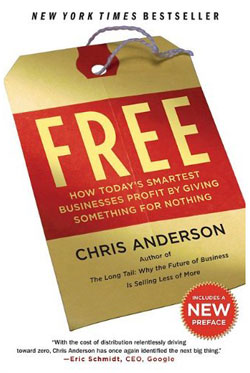The trouble with free
 Friday, May 6, 2011 at 5:00PM
Friday, May 6, 2011 at 5:00PM  Free is the new business model and we like free don’t we?
Free is the new business model and we like free don’t we?
Free search, free information, free social media, free apps, free newspapers - the list is almost endless as businesses adapt to this new model.
Business writer and editor-in-chief of Wired (£2 per copy on subscription), Chris Anderson (not to be confused with the guy who runs TED) followed his best selling Long Tail book with another best-selling book entitled “Free: How today’s smartest businesses profit by giving something for nothing” (available from Amazon for £5.45) which documents this 21st century business phenomenon.
The strap line for the book “How todays smart businesses profit...” is a clue to what’s happening here.
 One of the examples in the book concerns that of King Gillette and how he built a hugely successful empire on the back of giving away the razors that were useless on their own but created a demand for disposable blades.
One of the examples in the book concerns that of King Gillette and how he built a hugely successful empire on the back of giving away the razors that were useless on their own but created a demand for disposable blades.
Billions of blades later the rest is history giving birth to a business model that is the foundation of entire industries from free mobile phones with monthly call/data plans to cheap video game consoles with pricey games to free coffee machines in offices with expensive coffee sachets to satellite TV with monthly subscriptions and so on.
The approach pioneered by Gillette became known by economists as “cross-subsidy”. Get something free as long as you bought something else.
Anderson convincingly proposes that a new kind of “free” business model has emerged as a result of the web because the costs of the products themselves is falling fast. Recording artists Prince, Radiohead, Nine Inch Nails and the thousands of artists who launched themselves off YouTube and MySpace have all benefitted from the audience-building concept of nada.
But you know what? None of this is free
Whether it’s that free newspaper you pick up on your morning commute or that Facebook page you update religiously, someone, somewhere is paying.
But as long as it’s not you it’s great right?
Well, maybe...
Let’s play a game. Answer me these questions, if only in your head.
How much would you charge to sell me:
- your web-browsing history?
- your purchasing history?
- your list of friends and business contacts?
- your social security number and credit card info?
 We are now so conditioned to free that we sometimes forget to value these things to balance the deal.
We are now so conditioned to free that we sometimes forget to value these things to balance the deal.
So what has this to do with learning and education?
Well, a friend of mine in the UK education sector recently told me that due to the cuts in public sector spending that he would no longer be able to attend paid-for conferences.
Another colleague in government told me that an edict from the UK Cabinet Office stated that departments could no longer support commercially operated events. Now I don’t mean events designed for commercial purposes like trade shows that also fall under the ban but also any event that is being operated by a commercial company - like LWF for example.
At first pass given the precarious state of of public finances in the UK these seem like prudent measures to encourage the private sector to become more resilient and less dependent on the public purse.
I’d also be the first to say that during the glory days there were a host of chancers who would set up a conference at the drop of a new government agenda and trouser the cash. These events added little to the idea of debate and were simply promotional exercises for the agenda, its followers and any commercial parties who were in on the act. Those in attendance got their day out, a free lunch and nodded (off) at the required times.
Optional musical interlude:
Naturally, as someone who monetizes their organisation by hosting events, I have an interest here. LWF’s “free” bit is the distribution of valuable resources and facilitating a platform for unfettered dialogue made possible by this “monetization”.
But what if we did it a different way?
What if we made all our events free to attend?
Well, we have thought about it and it could be done. However the nature of the events and the discussion via our various communities would change beyond a point that I would feel comfortable. There a numerous free events, summits and even “world forums” aimed at the education sector. Some even fly you across the world and put you in expensive hotels.
There a numerous free events, summits and even “world forums” aimed at the education sector. Some even fly you across the world and put you in expensive hotels.
But are they free?
No, they’re not and someone is paying. Someone who quite reasonably has an interest in gaining a return on their investment which means the programme of these events, just like the editorial in your free newspaper, will be influenced by those who control the purse.
The education supply sector is after all a business, no different from any other. It relies on influencing the thought leaders, opinion formers and budget holders.
Without commercial supporters the delegates would have to shoulder the entire costs of attending the event which could be considerable. The rightly renowned TED conferences charge their delegates upwards of $6,000 to attend and even then take sponsorship dollars for funding the pre-roll on their gorgeous videos.
But what commercial organisation in their right mind would support a dialogue that may question their position in the market or enable an open dialogue that may take the market in a totally new direction that isn’t in line with their business plan and quarterly returns?
Only those who are courageous, authentic and secure in their own position. Of course, as a reader of this blog you’re smart and savvy. You know when you’re being sold to and when the agenda is being pre-programmed to deliver a certain result.
Of course, as a reader of this blog you’re smart and savvy. You know when you’re being sold to and when the agenda is being pre-programmed to deliver a certain result.
I’m not as naive as to suggest that some of those free junkets or conferences hosted by a single commercial vendor or consortium don’t hold an element of value, after all if nothing else there’s always a chance to catch up with your mates, but the control of debate and the agenda solely for commercial ends fills me with concern when it relates to the future of learning and that of our children.
And that’s why free ends up being the most expensive option of all.
 Graham |
Graham |  5 Comments |
5 Comments | 

Reader Comments (5)
Having worked for Gillette for 14 years before entering the games business. I can attest to the value of cross subsidy and sampling. I succeded in convincing Gillete to mail out 10 million sample Trac 2 razors in order to accelerate trial f our clearly superior ( and higher priced) shaving system in 1970, and got a write-up on it in Newsweek Magazine. You don't have to pay if you don't buy. Free is what made YouTube and Google and Zynga and Playfish what they are today. Its not a guaranteed strategy for ongoing success, but there is nothing eveil about it.
I feel that there is a bit part of this article in the waste bin about the free iPad for LWF delegates who register early and pay approximately the cost of one iPad extra for a ticket to your conference. Surely this omission is subtly added by the last image, but a braver reference could be added as text surely? I am after all, ironically, writing this on my _free_ iPad from the LWF2011 conference!
Additionally there is the rising of the web2.0 world which is free and so not free at the same time. There are many more points to consider in this "free economy".
I agree with the essence of Graham's article. I've been fascinated to have had the opportunity to study and compare the free offerings from MicroSoft and Google with MS 365 and Google Apps. I must say, I'm impressed by both, but they differ very much when you actually start to look at the way they are set up, and just how far free goes. I'll not comment, but let's say each really is free to you, but one leads you to want to spend! You guess.
There is a great deal of psychology being employed here.
When I was at Teacher Training College I was suckered into running the College. Actually, I quite enjoyed it, but apart from just delivering a newsletter, I wanted to stop the fact that, as it was free, the common room was littered every time an issue of The newsletter was issued. I went the opposite direction. I gave it a value - which had to go to committee for agreement. There were the naysayers, but I won through. We started charging 1p for something that went from a 2 sided newsletter to an 8 page graphic magazine. Guess what? Even at 1p, every copy disappeared. Free is notcalways best, but it is also not appreciated all of the time.
So....did you spot the deliberate mistake in my contribution? The work "Newsletter" would have made sense after College!!!!! I never did run the College.
John
Thanks for the comments & feedback!
@Chris
I'm not suggesting that cross-subsidy marketing or the kind of free models used by Facebook, Google et al are necessarily evil my point is that we should practice "critical consuming" and consider the value of what we are giving away in return for certain services.
Without being paranoid we can only assume that by giving away so much personal data to Facebook it has become the single largest global identity database in the world. A simple matter of running a face recognition script on the FB servers and connecting it to CCTV and other databases is not difficult to imagine under "threat of terrorism".
Likewise, we can only assume that our Gmail accounts are being constantly analysed if only by a robot seeking to serve us with relevant advertising.
@Matt
:)
I thought subtlety amongst such a smart audience would be better than spelling it out. One only has to click on the image of the iPad to find out what was meant.
However for the avoidance of doubt we pay for every iPad our delegates receive and Apple have zero input into our event programming or editorial.
Our inclusion of devices within delegate registration is not quite the gimmick that one might think it is. We found after hosting our conferences for a number of years that many members of our choir were not able to or sometimes not willing to try new devices. This made the discussions at our events somewhat theoretical and our decision last year to provide iPads whilst banning the use of paper and pens was to encourage people to walk the walk.
I do wonder however how many people would register if we didn't provide the iPad and charged the same as other academic conferences which would, in fact, be more than we currently charge with the iPad included.
@ All
The overall point I've tried to make here is that whilst "free" works for many things it always comes with a price.
In the case of the debate over the future of learning then my personal belief is that this dialogue needs to happen with the programme and agenda being controlled by government or commercial interests.
If nobody wants or is able to pay to participate in such debate then we will have a continuation of global policy makers and other influencers being flown to "summits" and "world forums", placed in 5 star hotels to drink the Kool-Aid provided by whoever's picking up the tab.